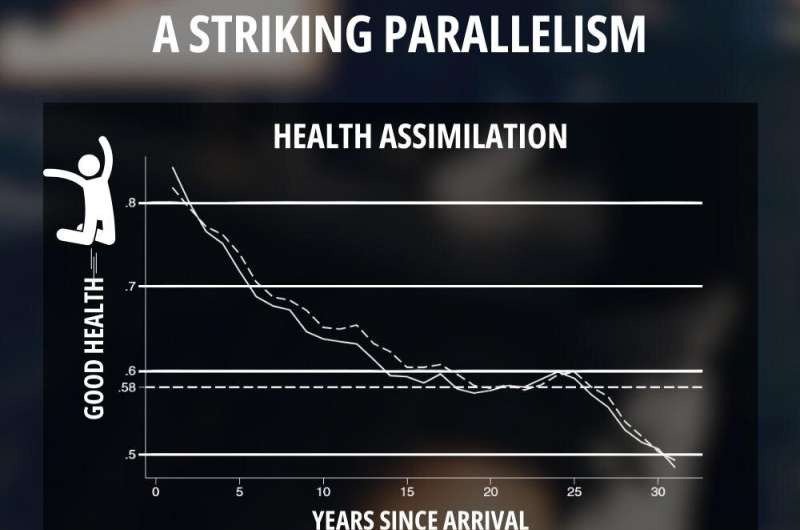This article has been reviewed according to Science X's editorial process and policies. Editors have highlighted the following attributes while ensuring the content's credibility:
fact-checked
trusted source
proofread
Study: Unhealthy sleep assimilation among immigrants may be correlated with labor market

Upon their arrival in a foreign country, immigrants tend to be healthier than natives, but their advantage erodes with time, despite improvements in earnings and socio-economic status. A new study published in the European Sociological Review by Francesco Billari (a demographer at Bocconi Department of Social and Political sciences, as well as the University's Rector), with Osea Giuntella, Fabrizio Mazzonna, and Luca Stella, documents that the health trajectory is strongly associated to the evolution of sleeping behavior.
Immigrants sleep significantly more than natives upon arrival, but their sleep advantage dissipates with years spent in the host country. Since sleep deprivation has been linked to many chronic diseases, including type 2 diabetes, heart disease, obesity, and depression, the parallelism cannot fail to strike us.
The analysis conducted by the authors in Germany shows that, after 10 years, immigrants' advantage in sleep duration is reduced by up to 60% and their advantage in sleep satisfaction is completely erased.
Prof. Billari and his colleagues use data from the German Socio-Economic Panel (SOEP), which, among other things, has been collecting information about sleep duration and sleep satisfaction since 1984. Observing individuals aged 18–59 at the time of the interview in the period 2008–2015, they obtained a final sample of 118,233 person-years from 33,143 individuals.
Immigrants upon arrival sleep about 23 minutes longer than natives, are approximately 52% less likely to sleep less than six hours and 39% less likely to sleep less than eight hours. They also are 14% more likely to be satisfied with their sleep. Less educated immigrants have a larger advantage, but it declines more rapidly. People with a wage below the median experience a similarly fast decline.
The erosion in sleep advantage seems to be correlated to the labor market. Less educated and poorly paid immigrants are more likely to have physically exhausting jobs with early schedules, and the decline in sleep duration and sleep satisfaction is largely driven by immigrants who start working between 4 and 6:30 am. No evidence of a significant decline in sleep duration among individuals starting work after 6:30 am is found.
"This pattern is consistent with the hypothesis that immigrants with lower levels of education may sleep less as a result of the higher levels of psychological stress associated with structural disadvantage and is consistent with previous studies on ethnic penalties in the labor market," commented Prof. Billari.
More information: Francesco C Billari et al, Unhealthy sleep assimilation, European Sociological Review (2023). DOI: 10.1093/esr/jcad065
Provided by Bocconi University




















